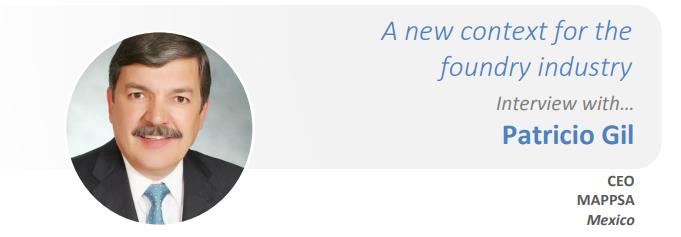
Discussions around the necessity of a change in the supply chains have also been raised in our industry following the impact of the Covid19, with voices asking for shorter ones. Do you think this could be an opportunity for foundry producers like Mexico to become an alternative for some of these supplies?
I believe Mexico offers great opportunities for the foundry industry mainly to supply the North American market and mainly for these reasons:
▪ The opportunity to replace volume currently imported from Asia to reduce the supply chains.
▪ The opportunity to replace volume currently imported from China to USA which is affected by tariffs imposed by the US Government.
▪ Since Mexico is becoming an important manufacturing place and more manufacturing in moving from USA and Canada to Mexico there are new opportunities coming to México.
▪ Mexico has availability of labor at very competitive cost.
The forecasts warn auto sales in US to see a drop for 2020, with a new share in markets to be consolidated in response to this drop in demand. The evolution of E-mobility is also an impacting factor in the industry. In this context, how do you see the future for this big driver for metalcasting in America?
The automotive industry is the main consumer of metal castings so after the volume drop and the emerging of e-mobility we should review our product portfolio and our business model because the market is demanding more flexibility, reduction in delivery dates and more variety of grades of metals. We should be able to question our traditional methods of producing castings and adapt to the new ones. Additionally, the emerging of additive manufacturing is changing the market rules for prototyping and low production runs.
Foundry companies need now to be creative to take advantage of the changes in the new context, with many managers reporting they have been asked to think out-of-the-box when planning new strategies. Based in your wide experience, which can be some leadership keys for foundry management in this new road ahead?
It is very important to be near the customers and understand the new requirements. As I mentioned before the new trend is flexibility and rapid response time. We should see the evolution of manufacturing technology especially on predictive maintenance, process control and product development such as simulation tools. One big challenge is to attract, develop and retain people we should be also willing to try new working ways of collaboration. The combination of talent between the foundries, the foundry suppliers and research center is a key factor to continue building competitive advantages.
It has been highlighted that those foundries working for different industries and segments have been more resilient in this actual pandemic crisis. Do you think diversification can be a must for the foundry industry in the future? Could this be more focused in bigger portfolios for different industries or in an increase in exportations to new geographic markets?
Yes. Diversification is always beneficial for the business cycles.
If we may combine different markets with different geographic regions is very good for the business. What is important also is to be aware of threats such as material replacement or obsolescence of the end products we are making parts to.
Foundries have also faced complicated restrictions regarding social distance and travelling, which led the way to the use of remote working tools for administration, sales, learning or networking. In which way do you think these tools have come to stay and to help digitalizing our industry?
Foundries as well as other industries are facing complicated times. These pandemic restrictions help us review our management processes and it is a great opportunity to review our business practices trying to be leaner and more efficient. I believe some of the new business practices such as virtual meetings, flexible working schedule, home office and less travel are here to stay. In some way the new business practices and the new generation of foundry technicians and executives is a new great combination to make the foundry industry more competitive.
How do you perceive the impact for the North American foundry industry with the new Free Trade Agreement signed between the USA, Canada and México (T-MEC)?
The new Free Trade Agreement will be beneficial especially on the automotive sector because it increases the limits of regional content for the vehicles so the OEM´s have an incentive to buy the castings regionally. Additionally, the commercial discussions and tariffs imposed between the USA and China makes more attractive to buy locally and reduce the import of castings from China.
Author:Patricio Gil has more than 35 years of experience in the foundry industry. Former CEO of Blackhawk Foundry. Past President of the Ductile Iron Society, Past President of the Mexican Foundry Society and Past President of the American Foundry Society. Frequent speaker in foundry congresses around the world. Currently managing its own machining company.
